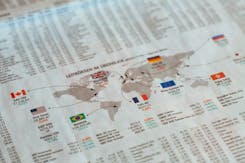What Are Frontier Markets?
All products and services featured are independently selected by WikiJob. When you register or purchase through links on this page, we may earn a commission.
- What Are Frontier Markets?
- What Countries Are Classified as Frontier Markets?
- Are Frontier Markets Different from Emerging Markets?
- What Are the Benefits of Investing in a Frontier Market?
- What Are the Risks of Investing in a Frontier Market?
- Tips for Identifying Potential Growth in Frontier Countries
- What Are the Best Investments in Frontier Markets?
- Final Thoughts
What Are Frontier Markets?
Frontier markets are global regions that are in the process of development.
They are situated below developed markets such as the US and emerging markets like China and Russia.
Investors looking for larger returns may look to these frontier markets for growth and investment diversification.
To be considered a frontier market, the region must have:
- A degree of openness to foreign ownership
- A partial ease of capital flows
- At least two companies worth $700 million each, with a security size of $53 million and 2.5% ATVR
- A modest, efficient operational framework
- High availability of investment instruments
- A modest level of institutional framework stability
What Countries Are Classified as Frontier Markets?
According to Morgan Stanley Capital International (MSCI) the countries that currently meet the frontier market requirements are:
| Bahrain | Jamaica | Panama |
| Bangladesh | Jordan | Romania |
| Benin | Kazakhstan | Senegal |
| Bosnia and Herzegovina | Lebanon | Serbia |
| Botswana | Lithuania | Slovenia |
| Bulgaria | Mali | Sri Lanka |
| Burkina Faso | Malta | Togo |
| Côte d’Ivoire | Mauritius | Trinidad and Tobago |
| Croatia | Morocco | Tunisia |
| Estonia | Niger | Ukraine |
| Ghana | Nigeria | Vietnam |
| Guinea–Bissau | Oman | Zimbabwe |
| Iceland | Palestine |
Are Frontier Markets Different from Emerging Markets?
Frontier markets are often considered a subcategory of emerging markets; however, there are distinct differences between the two.
Frontier markets are smaller, riskier and less liquid. The population is younger, more ambitious and is likely to create wealth. Frontier markets also carry less geopolitical risk.
The combined market value of a frontier market is approximately $512 billion.
Emerging markets are recognized and established. They are counties like China, India, Russia and Brazil.
Their combined market value sits at approximately $20 trillion.
As countries develop, the number of frontier markets decreases.
Over the past five years, markets such as Kuwait, Pakistan, UAE and Qatar all leveled up, leaving gaps in the frontier market.
However, becoming an emerging market does not always guarantee success.
For example, Pakistan failed to attract sizeable investments after its elevation in 2017. Subsequently, it experienced its worst foreign sell-off since the 2008 global recession.
Argentina and Turkey are also at risk of falling back into the frontier market category for failing to maintain emerging market standards.
The 2019 capital controls in Argentina have rendered it nearly impossible for international investors to access the country’s equity.
The authorities in Turkey have imposed a ban on short-selling and limited foreign access to the local currency.
There are strict standards and expectations that all markets need to meet to be frontier, emerging or developed market. Failure to achieve and maintain these will result in a demotion.

What Are the Benefits of Investing in a Frontier Market?
As with any market or investment, there are advantages and disadvantages.
The benefits of investing in frontier markets are:
- Diversification of investments – The lack of developments in these regions provides a diversification level no longer available in developed markets.
- Easier to find undervalued investments – Western investors tend to overlook frontier markets, so they usually do not contain overvalued stocks.
- Easier to position yourself for a larger return – As the crowds of investors have not shown up yet, there is more space for you to establish your position.
- It is not affected by the world yet – Frontier markets suffer less impact from global events such as recession, and they are less likely to get caught up in geopolitical skirmishes. A market such as Serbia is less likely to draw negative attention from developed markets. China, however, is currently at odds with the US, which is straining their relationship and potentially affecting future growth.
- May offer a better return than an emerging market – No one can predict the future, and not all emerging markets are successful. There is always the possibility that a frontier market could flourish and become a unicorn market.
What Are the Risks of Investing in a Frontier Market?
- Low liquidity – As the markets are so new, there is very little trading information about them available. They might also not have established trading hours. These factors make it difficult for traders to buy and sell at any time.
- They are volatile markets – They may not be as affected by global events; however, frontier markets are still subject to domestic politics. As these countries try to build themselves, market values can fluctuate more than other markets.
- Politics can cause disruptions – As seen in Turkey and Argentina, not every person in a country is happy to see change and development. Local politicians can disrupt the market value either through sanctions or their behavior (humanitarian violations, etc.).
- Lack of regulation – Frontier markets lack the financial regulatory institutions that developed markets have, and they also lack standard legal regulations. It is not uncommon for a Western investor to be scammed, have their money stolen or be told a contract no longer exists.
- Systematic risk is more significant – When a country develops, many factors are working together to build an entire infrastructure that works. As this continues, the country is at risk of the whole market falling, not just parts of it.
Tips for Identifying Potential Growth in Frontier Countries
When identifying potential frontier markets to invest in, consider the following:
Step 1. High Population Growth
You want to invest in a country that has seen an increase in its population, especially in working age groups.
Step 2. Health
Data on life expectancy and infectious diseases will indicate a country’s overall health.
Projects such as improvements to sanitation facilities and hospitals also specify how a country is trying to improve its living standards.
Step 3. Low Per-Capital GDP
Countries with low per-capita GDP are worth considering, particularly if all institutions and the workforce are committed to transforming.
Step 4. Urbanisation
Larger cities with improved living conditions often increase in population. This in turn, increases GDP.
Step 5. Ease of Doing Business
The World Bank Doing Business Index and the Index of Economic Freedom by The Heritage Foundation provides information regarding conducting business in different markets.
As a rule, frontier markets should be open to investment and be considered good people to do business with.
Step 6. Do Not Do It Just Because
Investing in a frontier market because it carries that label is unwise.
These markets are in their infancy and have an equal chance of success or failure.
Before investing, ensure the country is showing a true dedication to its growth by assessing if all the fundamentals are in place.
Step 7. Build a Strong Network of Locals
As the risk of being scammed is high in an unregulated market, making friends with the locals will help reduce that risk.
They can potentially tell you whom to do business with and who not to, as well as where the good opportunities are.
Step 8. Do Your Research
Learn everything you can about the country before you invest:
- The history – especially the political history and how the people are treated. Is it wise to invest money in a country accused of genocide?
- What makes the decision-makers see red – you do not want to upset a person of importance and be jailed.
- What are the local laws and customs – hiring a local lawyer (and paying them more than their fee) will help with legal matters; however, ensure you know what to expect first.
Step 9. Be Hands-On
A frontier market cannot be traded on an app.
To receive the best investments, you need to visit the place and make the deals yourself.
Depending on what you are investing in, you may need to be present in person to sign the contract.
In Cambodia, for example, it is common for contracts to be confirmed with signatures and fingerprints.
What Are the Best Investments in Frontier Markets?
Frontier markets are not like other markets. You will not find them on the FTSE100.
Instead, when investing in frontier markets, you should consider:
- Real estate – The country is planning on growing exponentially. This involves the development of housing, hospitals, schools and retail outlets.
- Starting your own business – Depending on the local laws, it could be possible for you to open up your own business or franchise in that country.
- Investing in a local’s business – Economies depend on SMEs and the self-employed. If you find a local with a good business idea, invest in it.
Education, sanitation facilities and healthcare all need financial investment if they are to be improved. Evaluate your options in these categories to see if you can/should invest.
Final Thoughts
Investing in frontier markets can come with a lot of risks. It should only be considered by investors with high amounts of risk capital.
For those considering frontier markets:
- Make sure you do all your research into the country first
- Build a network of contacts before handing over any money
- Never risk more than you can afford to lose
WikiJob does not provide tax, investment or financial services and advice. The information is being presented without consideration of the investment objectives, risk tolerance, or financial circumstances of any specific investor and might not be suitable for all investors. Past performance is not indicative of future results. Investing involves risk including the possible loss of principal.





